Breaking into today’s bustling marketplace as a startup can be incredibly challenging. But your venture has immense potential to succeed and scale with the right approach to exploring and exploiting online opportunities. One particularly potent weapon in your digital marketing arsenal is Search Engine Optimization or SEO.
Let’s dive deep into SEO together and discover how it can propel your startup to achieve unhindered growth and enduring success.
Why SEO Is Crucial for Startups

In digital, search engines command an authoritative role. They determine which websites grab explosive attention and which are left wallowing in obscurity. That’s why looking into search engine optimization (SEO) is worth it.
Every millisecond sees countless people typing away queries into a search box. What they’re really doing is seeking out providers who can fulfill their needs or solve their problems.
For all intents and purposes, consider search engines pivotal junctions where supply meets demand. And, much like any bustling marketplace teeming with shoppers ready to fill their carts, sellers vie fiercely for attention.
The beauty of SEO is that it helps you stand out amidst that cacophonous spectacle by ensuring you rank higher in search results.
The Benefits of Implementing SEO Strategies for Startups
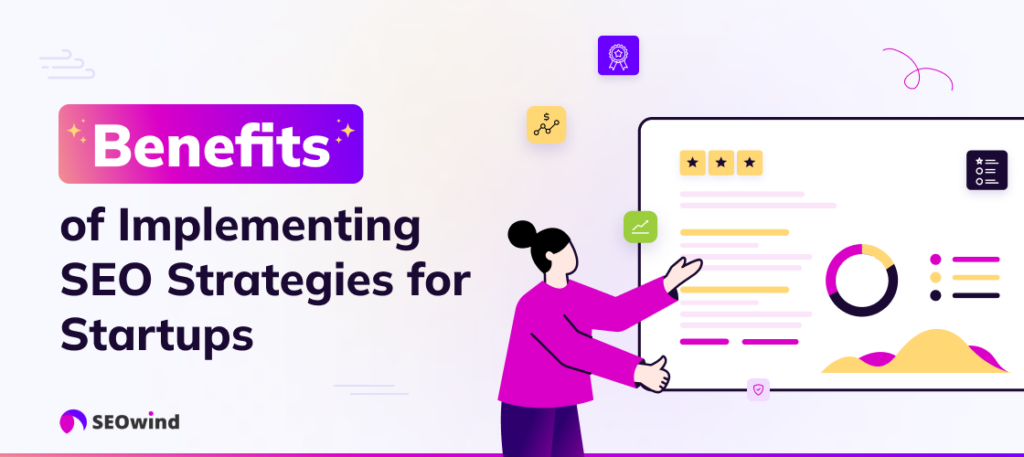
Adopting an effective Search Engine Optimization (SEO) strategy offers numerous benefits for startups. It provides the tools and techniques to enhance your business’s online presence significantly, attract more website traffic, and outperform competitors who are unaware of this powerful tool. I will walk you through some key reasons why any startup should pay attention to what SEO is and how it can become a secret weapon in their arsenal.
Reason 1: Capitalizing on Macro Trends in the Industry
Online marketing has seen enormous changes over the past decade, with a significant shift towards greater digital visibility. By mastering SEO strategies, startups can ride on these macro trends that sweep across various industries.
According to BrightEdge research, organic search drives 53% of all site traffic. Thus, capitalizing on current industry trends by utilizing robust SEO practices will ensure that your startup doesn’t get left behind in terms of online visibility.
Reason 2: Tapping into the Search Demand for Your Products or Services
Your prospects search online for products or services similar to yours every day. People use search engines like Google to seek answers to their questions and solutions to their problems.
Imagine if your startup could cater precisely to this demand! A properly executed SEO strategy does that by dynamically aligning your business with prospective customers’ search activities.
Data from Junto emphasizes that 93% of all web traffic comes from a search engine. Therefore, neglecting such a vast avenue of potential discovery would be the same as leaving money on the table.
Reason 3: Utilizing Free Organic Traffic to Scale Your Business
By investing time and resources into an effective SEO plan, you can tap into this “free“ organic traffic source and significantly reduce your acquisition costs. This financial efficiency allows for the redistribution of resources to other critical areas of business growth like product development or customer service.
Explaining the Relevance Of SEO in Driving Organic Traffic and Increasing Visibility
Fundamentally, SEO is about enhancing your website’s visibility on search engines. It elevates your website’s ranking for relevant searches within your industry, increasing its visibility for potential customers.
This leads to an increase in organic, unpaid traffic. Organic traffic tends to be high quality because it comes from users who have actively searched for products, services, or information related to your business offering.
In today’s fiercely competitive digital arena, where startups rise and fall at lightning speed, your online visibility is crucial. An SNP study shows that 75% of people never scroll past the first page of search results. A sobering thought indeed! So, taking steps to ensure you’re seen by those seeking what you offer becomes paramount.
Implementing efficient SEO strategies amplifies your reach and the chances of attracting and retaining customers over time.
How SEO Helps Startups Compete with Established Competitors
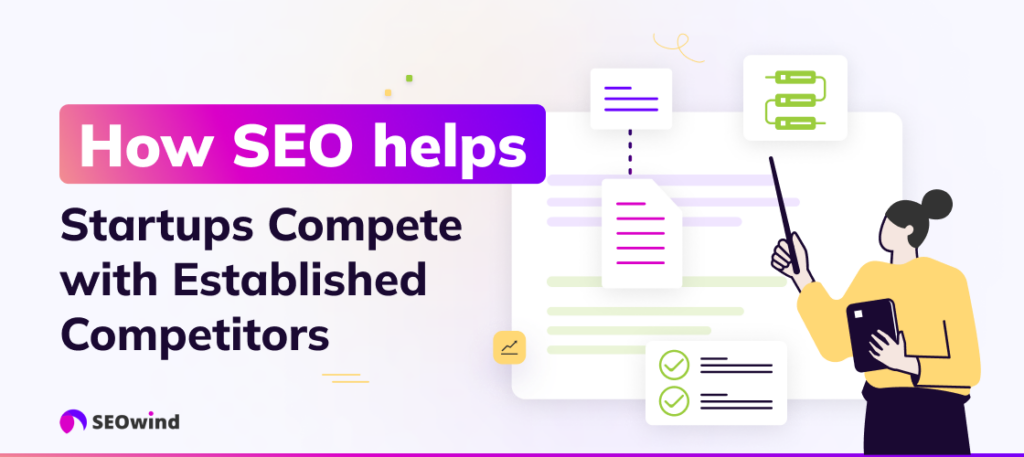
One of the most significant challenges startups face is going toe-to-toe with established brands in their respective sectors. Fortunately, Search Engine Optimization (SEO) can help level this playing field despite the advantages these established competitors possess in terms of resources.
Morning Upstarts Versus Giants
Your startup is the proverbial David to a Goliath in your industry.
From an investment standpoint, allocating funds for billboard advertisements or television commercials often proves futile against household names that have been advertising on these platforms for decades.
Meanwhile, seasoned companies usually have an incredible amount of content on their websites due to years of operation boosting their SEO without additional effort. Despite this obvious edge, don’t lose heart! Here’s where strategic SEO shines, as it allows your startup to direct efforts where they will reap the most rewards.
Proving ROI and Cost-Effectiveness of SEO for Startups
Let’s talk numbers, specifically Return on Investment (ROI). Gone are the days when marketing campaigns were ambiguous endeavors where you crossed your fingers, hoping it would pay off eventually. Digital marketing with tools such as SEO provides tangible metrics that allow you clear visibility of how well (or poorly) your strategy performs.
Irrespective of their size, organizations must always look out for cost-effective initiatives that offer substantial returns. Due to its free organic traffic generation capabilities, SEO proves itself time and time again as both cost-effective and high-yielding.
Search engines favor web pages that provide value through quality content and user-friendly design over those who pay more for better rankings. This merit-based mechanism gives startups a viable shot at ranking higher than titanic corporations that have been around long before the digital era began.
Furthermore, SEO is a long-term strategy that delivers compounding benefits over time. Unlike paid advertising, where visibility drops once you stop paying, good SEO attracts quality traffic even after initial efforts and investment.
By implementing strategic keywords, educating your target audience through blog posts, and adopting best practices for meta descriptions, you’re effectively creating an evergreen platform that keeps bringing potential customers straight to your doorstep.
Incorporating SEO efficiently into your startup’s growth strategy can yield incredibly high ROI to facilitate the exponential growth needed to stand tall against much larger competitors.
Different Types of SEO Strategies for Startups
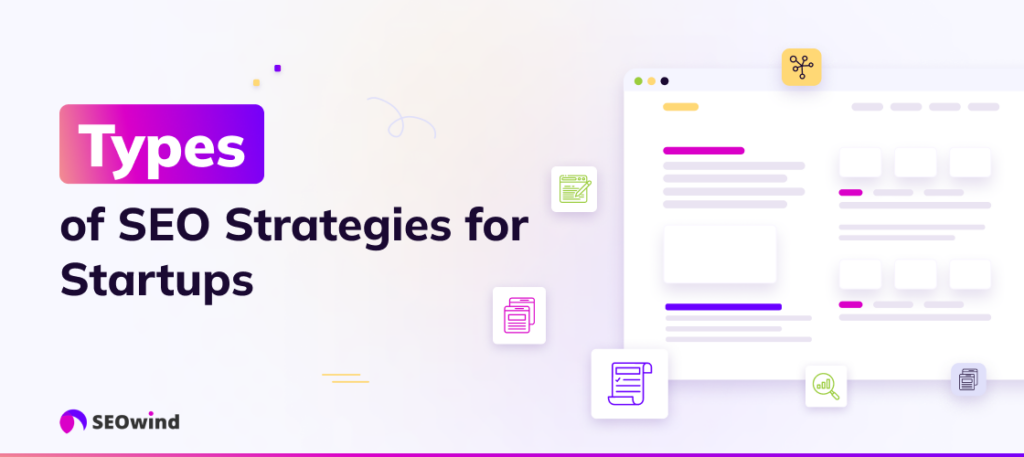
When you dive into the world of SEO, you’ll find a multitude of strategies designed to enhance your online presence. Working from an innovative startup’s perspective, we will dissect some tried-and-tested SEO tactics that can give your business a competitive edge.
Local SEO
Local SEO is crucial if your startup operates within a specific geographic region. It involves optimizing your digital content so that search engines can localize it and feed it to potential customers. This strategy includes creating a Google My Business account, encouraging customer reviews, and implementing other optimization methods that amplify visibility in local searches.
Technical SEO
Technical SEO refers to the background elements of your website: load speed, responsiveness, mobile-friendliness, and more. It makes sure search engine crawlers can read and index your site properly. Even if you have high-quality content on offer, indexing issues could keep it hidden from view.
On-Page And Off-Page SEO
On-page SEO focuses on aspects directly handled on your website. Think title tags, meta descriptions, URL structure, and content optimization. Contrastingly, off-page SEO involves building relationships and reputation outside your website, in the pursuit of which backlinks play an integral role.
Content-Based SEO
Content-based SEO involves crafting engaging materials that solve user problems and rank well in Search Engine Result Pages (SERPs). Developing comprehensive blog posts or in-depth service descriptions imbued with relevant keywords makes your site a hotspot for information seekers who may become future clients.
Create a wholesome mix of these techniques depending on what fits best with the resources. Remember, every startup has unique needs. No one-size-fits-all approach exists. This calls for tailored strategies yielding long-term benefits.
Getting Started with SEO for Startups
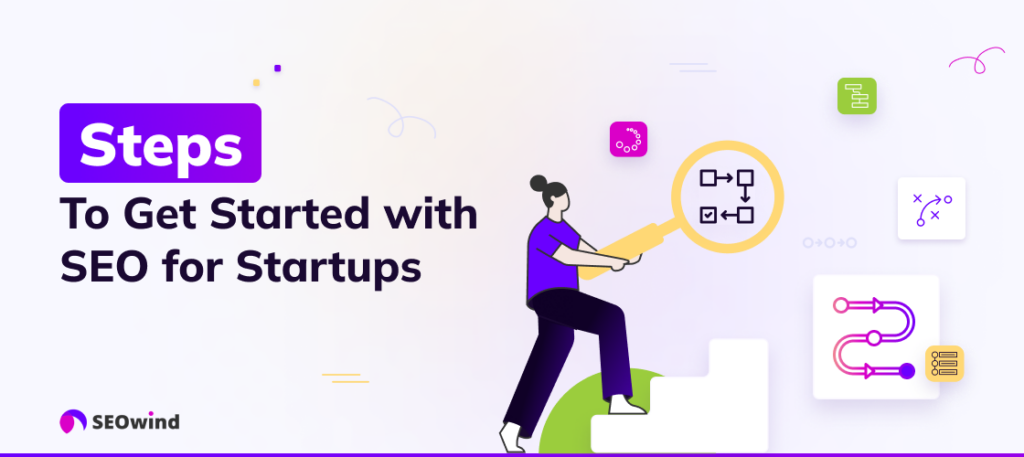
To embark on the SEO journey, you’ll first need to set a firm foundation. Let’s look into gaining the confidence of your stakeholders, setting clear objectives, and ensuring technical SEO best practices are observed.
Step 1: Gaining Buy-in from Stakeholders
Before diving into the intricate world of SEO, ensure all relevant parties within your startup understand the magnitude and importance of this undertaking. You should explain how implementing an optimized strategy that leverages “SEO for startups” could significantly boost the company’s visibility online, attract more organic traffic, and facilitate increased conversions.
It might be helpful at this stage to dispel any prevalent misconceptions about SEO like it is just a buzzword or only pertinent for large corporations. Instead, when describing how to start a search engine optimization business, focus on its multifaceted benefits, such as an improved customer experience, higher site usability, and brand recognition among potential customers.
Step 2: Setting Goals and Allocating Resources for SEO
After successfully obtaining stakeholder buy-in, it’s time to outline the specific goals you’d like your startup’s SEO strategy implementation to achieve. Are you interested in driving more targeted traffic to your website? Would you like to improve your website’s ranking on SERPs? Or reinforce brand authority?
No matter what aspiration fuels your ambition, identifying explicit objectives helps instrumentalize an effective step-by-step SEO strategy that aligns with these goals.
Step 3: Ensuring Technical SEO Best Practices
Finally, let’s touch on something a little technical. Don’t fret; I’ll simplify it for you. Ensuring that your website complies with technical SEO best practices is fundamental in trying to appear more attractive to search engines.
Technical SEO predominantly revolves around improving your website’s back-end structure and foundation. It addresses web page speed, mobile optimization, XML sitemaps, structured data, security protocols, etc. If your site isn’t crafted using these technical guidelines from top-tier search engine databases like Google’s algorithm, it’ll be at a significant disadvantage.
Implementing sound technical SEO practices ensures effective crawling and indexing by search engines, which facilitates positive user experiences that lead to better ranking results.
Rolling up our sleeves at the startup stage could mean saving substantial resources while simultaneously enhancing prospects and achieving digital growth goals through initial investment into Search Engine Optimization techniques.
On-Page SEO Techniques for Startups – best practices
Search engine optimization isn’t only about algorithms and bots. It’s also about understanding what people are searching for online, the answers they seek, and the words they use to find them. Understanding these human behaviors and combining them with technical elements is what we call on-page SEO techniques.
Keyword Research and Optimization
Contrary to some misconceptions, cramming your content with keywords won’t shoot you to the first page of search results. Quality matters here!
Start by identifying relevant long-tail keywords using tools like Google AdWords Keyword Planner or SEMrush. Once you collect a list of applicable keywords, place these naturally in your text where they fit most organically.
Additionally, ensure that your chosen keywords are incorporated into essential spots like headings, title tags, meta descriptions, URLs, alt text on images, and within your content. This tells search engines exactly what your page content offers.
Creating Engaging and Informative Content
It cannot be overstated how much quality outvalues quantity! Regularly updating your site with fresh material helps SEO, but always prioritize quality over frequency.
Research topics related to your industry niche that have yet to be thoroughly covered and create unique pieces around them. Craft captivating blog posts; design infographics that illustrate intricate statistics in an uncomplicated way; come up with how-to guides drawn from firsthand experience or expertise.
Here’s a simple rule: write for users first and search engines second. That will help generate user-focused content that both readers and algorithms value!
Persuading Readers through Engaging Storytelling Techniques
People relish good stories! So why not capitalize on this love by integrating storytelling into your SEO strategy? Narrative-style pieces can retain readers’ attention longer than bland blocks of information-crammed text.
Engage audiences by weaving compelling narratives around real-life experiences or case studies within your startup. Combine this with a strong call to action (CTA), and you’ve got a tool that doesn’t just captivate minds but hearts as well.
So go ahead! Embrace the power of stories to showcase your startup’s solutions on a human level and keep customers coming back for more.
Optimizing Title Tags, URL Structures, and Meta Descriptions
Title tags appear as clickable links on SERPs and help search engines understand what your webpage is about. Make them informative and engaging, and include your primary keyword at least once without overstuffing.
URLs should reflect website hierarchy wherever possible. For example, if I write a blog post named “our-startup-story,“ it could be nested like so: www.yoursite.com/blog/our-startup-story. A streamlined URL structure looks good and aids users’ understanding and search engine tracking!
Lastly, don’t forget about meta descriptions. These little snippets outline your page content below the clickable link in SERPs. While they may not directly contribute to SEO ranking factors, compelling meta descriptions can certainly increase click-through-rates from search outcomes– another win for SEO!
Multimedia
Adding multimedia elements such as images, infographics, or videos naturally engages visitors more than text alone. However, remember to optimize these assets properly.
Images should have descriptive alt-text that incorporates targeted keywords when relevant. This helps visually impaired readers understand image content via screen reader tools, an essential consideration for accessibility.
Equally important is maintaining optimal file sizes for fast load times while preserving decent image quality. Nobody likes waiting ages for pages to load or pixelated visuals!
By religiously following these on-page SEO methods within your startup’s digital approach, you’ll create an online presence that search engine bots love and offers unforgettable user experiences. This will translate into boosted organic traffic driven by nothing short of top-quality content. Happy optimizing!
Conducting Keyword Research for Startup – best practices
When implementing an effective SEO strategy for a startup, you cannot underestimate the importance of conducting comprehensive keyword research. This pivotal step sets the foundation of any successful SEO strategy.
Utilizing Keyword Research Tools to Identify Relevant Keywords
To kick-start your keyword selection process, leveraging appropriate tools can be pivotal in identifying which keywords are particularly relevant to your startup’s niche and offerings. Tools such as Google’s Keyword Planner, SEMrush, or Moz’s Keyword Explorer offer insight into potential keywords’ search volume, competition level, and difficulty score. Remember, finding a balance among these factors is crucial.
Use of Powerful Modifiers
Next on the list is utilizing modification strategies to enhance your chosen keywords. Add powerful modifiers like “best,” “guide,” “review,” or “2024“ that appeal to users during their search inquiries while tailoring your content to answer their specific needs. Your customers might use them when they are close to making a purchase decision or when seeking detailed information, leading them directly to your offering.
Focusing on Commercial and Niche Keywords with High Search Intent
Commercial intent keywords have less competition but higher conversion chances since they target consumers at the decision stage. Therefore, targeting more specific niche areas should form part of your game plan in dealing with SEO for startups.
Analyzing the Intent Behind Targeted Keywords
Always remember that behind every search made by a user lurks an intended goal, known as “Searcher’s Intent.“ Understanding this allows you to interpret why they are searching, allowing the creation of tailored content that tangibly addresses their pain points effectively or meets desired objectives efficiently.
Narrowing Down Focus for Effective Keyword Selection
Finally, don’t lose yourself trying to rank for every keyword you can think of. Narrowing your focus to keywords and phrases that are especially relevant to your startup offerings will yield the best returns. Precise offers ensure efforts aren’t scattered, resulting in increased chances of generating qualified traffic with real potential for conversion.
With these strategies in place, visits to your site won’t merely result in inflated views. They’ll translate into valuable engagements, potentially leading to conversions and ultimately attaining the growth you envision for your startup.
Creating and Optimizing Content for Startup SEO – best practices
The main engine of any effective SEO strategy for startups is content. It’s not just about cranking out blog posts but focusing on creating high-quality, relevant material to support your product or service.
Creating High-Quality and Relevant Content to Support Your Product or Service
The first step in this process is generating top-notch content that aligns with your products and services. As a startup, staying consistent with your business theme strengthens your branding and establishes you as an authority within your niche.
During this phase, focusing on quality over quantity is the key. Exhaustive research into the subject matter alongside optimal keyword placement enhances searchability while maintaining readability. Remember that users are human beings searching for solutions, not robots scanning for keywords.
Educating Your Audience about Your Startup’s Unique Value Proposition
Now that we’ve covered creating appropriate content let’s pivot to communicating your startup’s unique value proposition (UVP). This indicates what distinguishes you from other entrepreneurs competing in the same space.
Educate consumers about how purchasing from your company provides innovative solutions they won’t typically find elsewhere. Perhaps it’s time-saving technology or customer services available around the clock. Effectively conveying such details through informative articles and engaging social media posts will transform curious visitors into loyal customers.
Addressing Popular Questions and the Concerns of Your Target Audience Through Content
Next up is addressing common questions and concerns popping up in the minds of potential buyers. Picture these queries as buying obstacles.
Find popular queries using analytics tools. User comments on blog posts also serve as valuable data sources. Turn these pain points into insightful blog topics to paint compelling before-and-after narratives where utilizing your services comes off as the obvious choice.
Building an Authoritative Library of Information Rather Than a Publication House
Finally, view your content strategy through the lens of building an informational library instead of a mere publishing house. The critical difference lies in providing evergreen material that users frequently refer to and recommend. This turns your startup into an industry authority.
To reinforce this concept, create comprehensive pillar posts that provide extensive knowledge about specific topics that are hyper-relevant to your business domain. Maintaining regular updates ensures that your information stays current.
By adhering to these core principles, creating and optimizing content for startups becomes a stepping stone toward success, ultimately leading to unparalleled visibility, credibility, and trust among search engines and potential customers.
Off-Page SEO tactics for startups
SEO for startups isn’t merely about tweaking your website and its content. Getting noticed in the overcrowded digital world also requires off-page techniques.
Building high-quality backlinks from authoritative websites
Backlinks, or “incoming links,” are connections from other websites to yours. These act as internet referrals that direct users to your site, enhancing both traffic and authority. While numerous backlinks might seem advantageous on paper, remember quality beats quantity!
Imagine you are at a party full of industry experts. Who would you want endorsing you? A seasoned entrepreneur who has spent years building his credibility or a newbie? The answer is clear: the experienced entrepreneur’s recommendation carries more weight!
Applying this principle online means building relationships with authoritative sites in your niche. Having the link to your site will send positive signals to search engines and upsurge your credibility before potential clients.
Guest posting and influencer partnerships
Another effective off-page SEO tactic involves guest blogging on high-authority platforms. This nurtures symbiotic relationships where you provide quality content that serves your readers while fetching valuable incoming links for yourself.
Influencer partnerships bridge a similar gap by associating with popular figures who sway your target audience’s decisions. A favorable mention or review can spark interest among followers, drive traffic to your website, and amplify brand visibility.
Social media promotion and brand awareness
Few tools increase brand visibility, like social media. Creating engaging posts and targeted ads across platforms such as Facebook, Twitter, and LinkedIn – wherever your audience spends time – helps capture attention and keep tabs on emerging trends within your demographic circles.
This approach gives voice to customers’ praise (testimonials) or grievances (customer service), genuinely presenting your brand’s personal side. Further, an active social media presence indirectly boosts SEO by accumulating shares, likes, and comments, inciting fresh visits to your site.
So, don’t underestimate the power of off-page SEO tactics in getting noticed. Next time you’re crafting an SEO strategy, ensure these methods find a place on your priority list.
Building Backlinks and Growing Authority for Startup SEO
Backlinks work as reputation builders in the digital world. As you delve into the nitty-gritty of SEO for startups, having a solid backlink strategy becomes inevitable. So, let’s unravel how building backlinks can amplify your online authority.
Earning Backlinks from Industry-Relevant and Trusted Sources
The beauty of earning backlinks lies in its organic nature. It proves that your content has substance, relevance, and value — so much so that other websites endorse it by linking back. But remember that not all backlinks are equal. Aim to earn links from trusted sources within your industry or niche.
For instance, if your startup deals with organic fertilizers, getting a backlink from an agricultural university’s resource page will do wonders for your credibility in the eyes of search engines. To achieve this:
- Generate high-quality content that these trusted sites would naturally want to refer to.
- Reach out directly, asking them to link their site to yours if they find it valuable.
- Offer guest articles on subjects that could interest their audience while bringing visibility to your startup.
Collaborating with Other Companies to Build Partnerships and Gain Backlinks
Taking the collaborative path can steer more traffic towards you while investing comparatively less effort (and perhaps money). Forming smart partnerships with non-competitive but related entities benefits both parties involved. Think Ali Baba associating with local merchants! This symbiotic relationship enables you to co-create rich content appealing to diverse audiences simultaneously while attracting pertinent backlinks.
Aligning initiatives like webinars or eBooks with partner companies amplifies mutual reach while cementing credibility. Remember the keyword here: non-competitive partners!
Targeting a Global Audience to Expand Reach and Enhance Authority
Now comes the final chapter in this SEO playbook: expanding your reach globally. Remember when the question was posed: “Which choice represents the ideal backlink strategy?” This is where our narrative brings that global context into focus.
Breaking geographical shackles widens your potential audience and enhances authority. If local domains in various countries link back to you, more people across different regions can discover you, improving lead generation and conversions while strengthening your online authority.
A road worth exploring is contributing as a guest author on popular international platforms that align with your services or products. Keep cultural nuances and language differences in mind while crafting content for these audiences.
There’s no shortcut to building an authoritative presence online. Only steady, relentless effort can build credibility one quality backlink at a time.
Technical SEO Essentials for Startups
For startups diving into the world of SEO, technical optimizations play a crucial role. Let’s delve deeper and understand the significance of three core areas: optimizing site structure and navigation, emphasizing mobile optimization and responsiveness, and improving website speed for an enhanced user experience.
Site Structure Optimization and Navigation Improvement
Think about your startup’s website as if it were a sprawling department store. When customers enter, they need to find what they’re looking for across multiple aisles effortlessly. Similarly, an effective site structure aids in easy navigation, which is crucial for online visitors and search engines.
A solid plan during the initial stages can save you from potential chaos farther down the line. Here are a few tips:
- Keep it simple: Uncomplicated hierarchies work best. Limit categories and subcategories.
- Prioritize: Your most important pages should be easily accessible.
- Ease of Navigation: Make sure users can get to any page in no more than three clicks.
By enhancing user navigation, you improve engagement and help search engine bots better understand your content!
Mobile Optimization and Responsive Design
With mobile internet usage overtaking desktop usage globally, a lack of mobile optimization could seriously impede SEO efforts in this day and age. Google identifies mobile-friendliness as a ranking signal and prioritizes sites that display appropriately on smaller screens.
Start by testing your website’s mobility with Google’s Mobile-Friendly Test. If you encounter challenges like small text or links too close together, responsive design adjustment is essential in delivering optimal browsing experiences across different devices.
Some actionable ways to achieve effective mobile design include:
- Choose responsive templates when building or redesigning websites.
- Compress images to decrease load time without compromising quality.
- Simplify menus. Keep options clear-cut yet comprehensive. Thumb scrolling differs from a mouse click.
After all, it’s high time startups planning successful SEO strategies think mobile.
Implementing Technical Optimizations to Improve Website Speed and User Experience
In our fast-paced digital era, website load speed is non-negotiable. A slow site impacts user experience and can result in lower rankings on search engines. A study by Google found that as page load time increases from 1 second to 7 seconds, the probability of a mobile site visitor bouncing significantly increases.
Here are some ways to boost your website’s loading speed:
- Optimize images: Large files can slow down your webpage dramatically.
- Enable browser caching: This allows repeat visitors’ browsers to store elements of your site so they can load faster on the next visit.
- Reduce server response time: Look for performance bottlenecks like slow database queries and fix them.
Remember, an efficient website equals happier users, which leads to better SERP rankings!
Taking care of these essential factors goes a long way toward establishing a sound technical foundation for applying more advanced SEO tactics. As a startup hungry for growth, ensuring you’ve got this basic framework laid out effectively could be the difference between floundering in obscurity and scaling up to success.
Local SEO Strategies for Local Startup Businesses
Local Search Engine Optimization (SEO) is an art, a strategy that allows your startup to position itself within local search queries. Because digital trends are increasingly focusing on localized user experiences, becoming well-versed in this aspect of SEO can make a remarkable difference. Let’s dive into two critical factors: creating Google My Business listings and optimizing customer reviews and ratings.
Creating Google My Business Listings
As a startup founder, you would know the importance of visibility. When aiming to rank higher in local searches, Google My Business (GMB) becomes invaluable. One might even say it’s the Holy Grail. It’s free to set up and acts like an online directory entry for your business that appears when people search for your product or service locally.
The first step is straightforward: create a profile and verify your ownership. You then fill out all relevant sections with accurate information about your business: name, address, phone number, operating hours, website URL, and others.
And don’t just stop there; make sure you enrich your listing with photographs of your location or products to give potential customers a sneak peek into what they can expect. Pro tip: frequently updating these photos keeps your listing fresh and appealing.
If possible, I recommend including a virtual tour feature as well. Walk-ins may increase if people know what kind of ambiance awaits them!
Customer Reviews and Ratings Optimization
Now, onto something that resonates with everyone: managing perceptions. Remember when you last checked the review before trying out a new restaurant or buying some gadget online? That’s how important customer reviews have become today.
Enabling customer reviews on your GMB listing can build trust with potential clients quicker than you may realize. Furthermore, encouraging existing clients to leave feedback also improves local SEO ranking. After all, consistency matters.
While every business craves those five stars from everyone who visits, one or two less-than-perfect reviews shouldn’t cause undue stress. How you handle these speaks volumes about your business ethics and customer relationships. Respond thoughtfully without getting defensive. This can help mitigate any potential damage.
Keep in mind that Google’s algorithm loves those interactions! So don’t shy away from responding to even the good reviews with a brief thank-you message.
Local SEO for startups may seem daunting initially, but it can start paying dividends soon. Leveraging tools like GMB and managing customer reviews effectively could turn your little startup into a locally loved brand before you know it. Get those listings updated, savor those five-star reviews, and watch as positive changes come rolling in!
International SEO Techniques for Expanding Startup Businesses Globally
A pivotal moment in the journey of a startup is when they’re ready to cross borders and take on the challenge of global markets. But how does one navigate this unfamiliar territory? The answer lies in implementing innovative SEO strategies explicitly tailored for international expansion. Known as International SEO, these techniques can unlock unprecedented growth opportunities for startups looking to mark their global footprint.
Going global isn’t just about translating your content into another language. It’s about adapting your online presence to resonate with audiences in different countries. Implementing an efficient international SEO strategy benefits your brand’s visibility and identity establishment and ultimately helps skyrocket your growth worldwide.
Understanding Your Target Market
To find success in foreign lands, you have to talk their talk. Invest time in researching the local market dynamics and customer behavior. It’s all about understanding what drives them, their pain points, and how your product or service bridges that gap.
- Language optimization: Once you’ve determined your target countries, focus on optimizing content for those regions, addressing their specific needs and cultures.
- Localizing Keywords: Generic keywords might not perform well globally due to linguistic nuances and variations among dialects, even within the same language group. Therefore, local keyword research becomes crucial.
Website Configuration: CcTLDs, Subdomains, and Subfolders
One key aspect of international SEO is configuring your website structure properly. There are three ways you can extend your website on an international level:
- Country Code Top-Level Domains (ccTLD): These provide the strongest geographical targeting signals (e.g., .us for the United States or .fr for France).
- Subdomains: A secondary domain is created under the primary domain (e.g., us.example.com).
- Subdirectories or subfolders: This involves creating separate directories after the root domain (e.g., example.com/us/).
Each method varies in cost, maintenance complexity, and SEO impact. So, it’s advised to consider the resources available and your SEO for startup strategy when making a decision.
Establishing a Strong Local Presence
Establishing a robust local presence involves engaging with local influencers or other businesses. This engagement could lead to quality backlinks, which are critical for SEO. Collaborating locally also allows you to tap into two extremely powerful aspects: trust and authority within the foreign market. Remember, internationalization isn’t just about setting foot globally but making that footprint count by integrating yourself well within those global markets.
This was a sneak peek into the astonishing world of International SEO strategies. Embrace this approach as your secret weapon when you’re ready for unrivaled success on an international scale.
Monitoring, Tracking, and Measuring the Success of Startup SEO Efforts
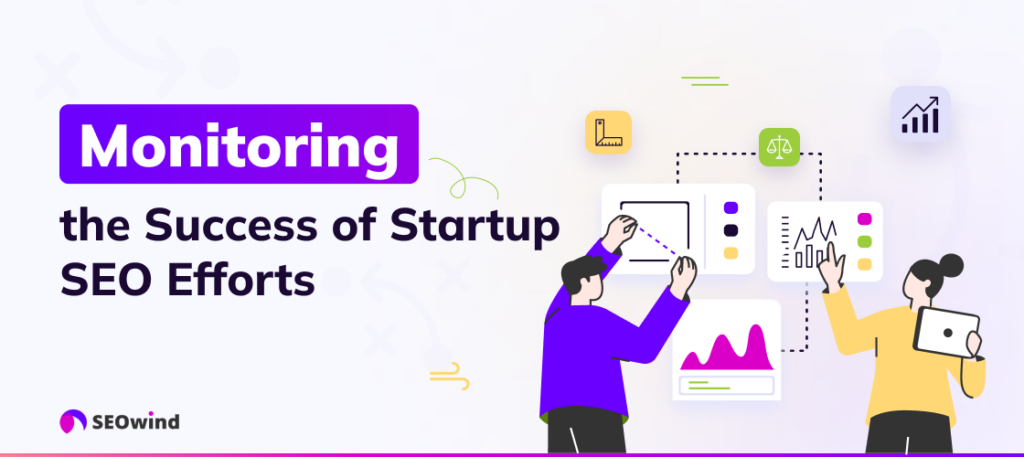
Sound knowledge of SEO for startups is undoubtedly an incredible asset. But it’s important to remember that implementing these strategies is only part of the journey. A quintessential component often overlooked in this quest is understanding how successful your efforts truly are.
Weaving our way through this digital tapestry involves tracking and evaluating performance metrics. But fear not! This doesn’t mean you’ll need a mathematics degree or a deep understanding of complex analytical data.
Let me guide you through the process of monitoring, tracking, and measuring the success of your startup SEO endeavors. With these insights, you can make informed decisions based on facts rather than guesswork.
Implementing Analytics Tools to Monitor Site Performance Metrics
The analytics tools allow you to track critical site performance metrics such as organic traffic trends, user behavior statistics like bounce rate and session duration, pages per visit, and many more.
Primary among them is Google Analytics, a free tool that offers a treasure trove of actionable information. Bing Webmaster Tools also gather valuable metrics when you’re focused on tapping into its emerging market share.
Consider adding a heatmap plugin like Hotjar or Crazy Egg to your arsenal. They create visual records showing where users click most often, helping identify patterns and guide future design changes.
Similarly noteworthy is SEMrush, which provides comprehensive visibility scores while benchmarking your website against competitors.’
The goal is to avoid getting lost in heaps of complicated data while harnessing significant numbers to fuel impactful decision-making processes!
Measuring Key Performance Indicators (KPIs) and Tracking Progress
Transitioning now into measuring KPIs, let’s think of it as akin to laying out breadcrumbs along our path. They help us determine what’s working and where we might’ve skewed off course.
Keeping track of industry-standard KPIs like organic search traffic, keyword ranking improvements, the number of indexed pages on your website, inbound quality links, bounce rates, and time on page should offer a well-rounded view of your SEO performance.
The most crucial thing here is to remember that growth in these KPIs takes time. Keep your sight set on the long-term horizon! One Internet Marketing Inc. study found that almost 50% of benefits from SEO are visible only after 4-6 months.
Arm yourself with tools like Google’s Data Studio for creating tailored reports and dashboards. It allows you to monitor progress over time effectively while unraveling complex data into compelling narratives!
So, heed this trusty guide when embarking upon your quest for Startup SEO triumph. Implement these tracking and monitoring tactics to become an illuminating beacon within your industry niche!
How can SEOwind help with SEO for Startups?
Navigating the Search Engine Optimization (SEO) landscape can be challenging, especially for young startups that have yet to gain ground in their respective industries. That’s where SEOwind comes in. Developed by practitioners and entrepreneurs who have experienced firsthand the challenges and opportunities in SEO, content marketing, and AI, this platform will supercharge your startup’s growth.
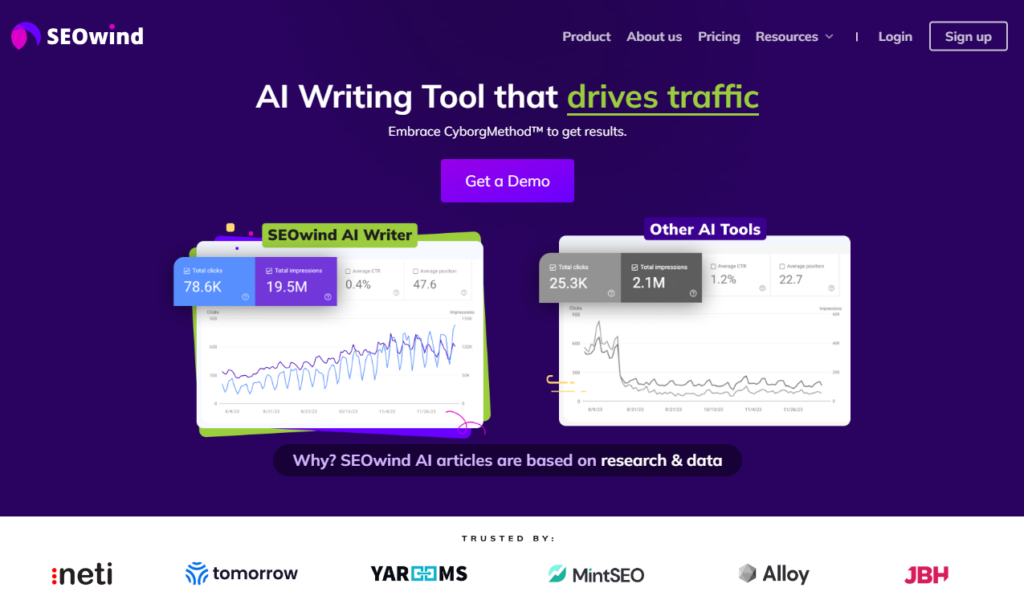
Let’s look into how they can do just that.
Keyword Research
SEO success hinges on appropriate keyword selection, but it’s not as simple as pulling relevant words out of a hat. In-depth research is critical, requiring both time and understanding of complex metrics.
With SEOwind, you don’t need to worry about that tedious process. The platform incorporates innovative technology to conduct efficient keyword research tailored specifically to your startup’s unique niche. It identifies trending keywords alongside those that are less competitive to give you an organic boost on Search Engine Result Pages (SERPs).
Understand the Search Intent
Recognizing what your potential customers are searching for online is one step; understanding why is another. This concept is known as search intent, and it often differentiates successful strategies from ineffective ones.
SEOwind identifies popular keywords and analyzes user behavior tied to these searches, a critical factor in developing targeted content that resonates with your audience while aligning with Google’s algorithms.
Create Engaging Content
As we all know, content is king in digital marketing. However, consistently crafting engaging copy becomes daunting because you must ensure it resonates with users while satisfying search engine guidelines.
Enter SEOwind. Aside from being an excellent tool for technical SEO tasks like keyword analysis or understanding search intent, it also excels at creating compelling content through its AI-driven writing framework called CyborgMethod™.
This method enables fast production of high-quality articles or blog posts that are comprehensive, research-based, and optimized for SEO, content that reads like an experienced human copywriter wrote it.
Optimize Content
Even the most engaging content will get lost in the digital abyss without proper optimization. It’s a precise science that strikes a balance between crafting human-readable texts and appeasing search engine bots with keyword placement, meta tags, header tags, and so much more.
SEOwind simplifies this process. With its intelligent AI solution, it doesn’t just help create content, it also optimizes it. Every aspect is covered, from automatically inserting relevant keywords to structuring your articles properly for better readability and crawlability.
Update Content
In SEO, no article or blog post should be classified as finished. Unfortunately, regularly updating online content is often overlooked because of the effort required. It’s fundamental to maintaining high SERP positions, as algorithms always prefer fresh material over outdated ones.
Thankfully, you don’t have to worry about keeping track of all your content yourself if you have SEOwind on your side. Equipped with advanced monitoring tools, our platform identifies which pieces need updates or revisions based on changes in keyword trends and industry developments.
By relying on SEOwind for your startup’s SEO strategies, the path to digital visibility becomes less convoluted. This commitment allows startups like yours to survive and thrive within their respective industries, making genuine growth achievable beyond just being visible online.
Common Questions and Concerns About SEO for Startups
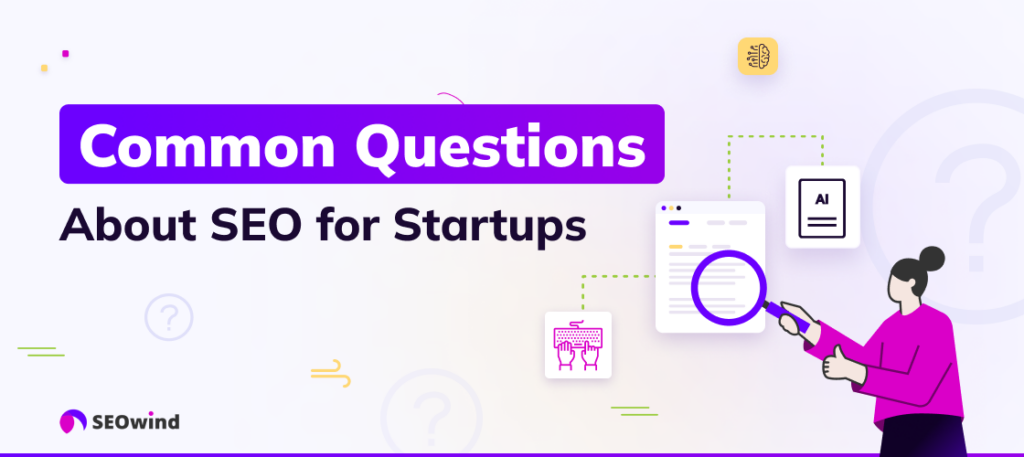
You may have diverse questions swirling around in your mind regarding the necessity, functionality, and effectiveness of SEO. Let’s address these commonly asked questions to clarify how SEO for startups can be a game-changer.
Do Startups Really Need SEO?
Yes! In unequivocal terms, startups absolutely need SEO. Believe it or not, irrespective of the industry you’re in or the product you offer, there’s a high probability that potential customers are out there right now, searching online for exactly what you’re selling. With well-executed SEO strategies, your startup can efficiently intercept these prospects and win them over. Conversely, if you’re missing from SERPs, chances are you’re handing these eager-to-buy customers directly to competitors without a fight.
Can Startups Implement SEO Strategies On Their Own?
While any business owner could dip their toes into the fundamental aspects of SEO, like optimizing meta descriptions or creating keyword-rich content, implementing comprehensive strategies requires technical know-how and experience in digital marketing trends. As with anything worth doing professionally, achieving desired results relies on expertise. This is where an SEO specialist or a dedicated digital marketing team could substantially skyrocket your growth!
Can Startups See Immediate Results From SEO Efforts?
SEO results depend on multiple factors, from the competitiveness of the search landscape to how well-established your online presence is already. Generally, it’s best to view SEO as a long-term strategy rather than seeking immediate gratification.
While you may witness minor improvements in weeks (or months) following your SEO implementation, significant changes might take up to six months or more. The key here isn’t instant success but sustained progress leading to long-lasting top-ranking positions and increased traffic.
The Importance of Experience, Expertise, Authoritativeness, and Trustworthiness (E-E-A-T) In SEO
Google’s algorithms rely heavily on E-A-T scores to rank web pages. Effectively communicating your startup’s experience and expertise through high-quality content helps establish authoritativeness in your field. Proving trustworthiness requires social proof: positive reviews or customer testimonies, for example.
By optimizing content around E-A-T principles, startups can enhance their standing with customers and Google bots.
Encouraging Startups To Invest In Long-term SEO Strategies For Sustainable Growth
From a business perspective, we must recognize that while fast solutions may seem enticing, sustainable success demands consistent effort over time. While paid advertisements are excellent ways to attract quick attention, they pay off as long as you’re willing to pay for them!
On the contrary, organic listings obtained through optimized SEO strategies persist indefinitely once established, even when you’re not actively working on it! Considering the aforementioned points about trustworthiness and authoritativeness, this system allows startups to grow steadily by building upon previous successes, ensuring greater ROI in the long run.


